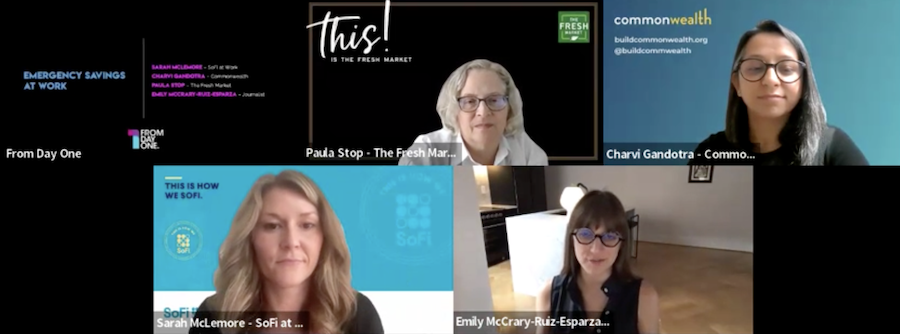How Companies Are Tackling Employee Financial Instability With Emergency Savings


As of 2024, 37% of American adults say they would struggle to cover an unexpected $400 expense. Financial precariousness shows up in the workplace as stress, disengagement, and turnover. Increasingly, companies are realizing that 401(k)s aren’t enough to ensure financial stability. Workers need short-term safety nets, too. That’s why a growing number of employers are experimenting with emergency savings programs.
At specialty grocer The Fresh Market, a routine employee survey revealed that financial wellness—not physical or emotional health—was workers’ top concern. What followed was a pilot program that helped employees build lasting savings habits and avoid relying on costly paycheck advances.
‘We See Emergency Savings as a Foundational First Step’
Every year, Paula Stop, the director of total rewards at The Fresh Market, surveys employees about what benefits they would like to see in the coming year. In 2022, she asked which of the following forms of wellness was most important: physical, financial, social, or emotional. “We were surprised,” she said during a From Day One webinar about emergency savings at work. “The top selection overall was financial wellness.”
Stop investigated and found that use of the company’s earned wage access platform was high—higher than she was comfortable with. Clearly, employees were struggling with cash, and they needed a better option than regular advances on their paycheck.
That’s when The Fresh Market tapped their long-time partner Commonwealth, a national nonprofit whose mission is to make access to financial security and wealth-building common and accessible. Having an emergency savings account is the first step to financial security, said Charvi Gandotra, the organization’s senior director. Without that cushion, people overly rely on paycheck advances, 401(k) loans and hardship withdrawals, and predatory loans. For some, it shows up in tax levies and wage garnishments. “Because life happens, people tap into some of those longer-term retirement solutions, and that’s what we are trying to prevent,” said Gandotra, “We’re trying to help strengthen. We see [emergency savings] as a foundational first step.”

Stop and Gandotra decided to add SoFi to the partnership. The Fresh Market had already been working with the digital bank for its student loan refinancing program, and Sarah McLemore, the senior director and business lead at SoFi, was ready to jump in and help. Emergency savings is often a great compliment to wage access, she says. “Earned wage access can be great in terms of avoiding going into deep debt. But on the flip side, you’re not teaching people how to save and prepare for big bills. They’re just going to get money when you need it. This is a nice one-two punch.”
Rolling Out Emergency Savings
They began with a pilot in Alabama, Mississippi, Louisiana, and the Florida Panhandle, areas where earned wage access was highest. The program let employees split their direct deposit at the time of payroll, and over the course of a campaign to encourage savings, the share of paycheck contributed to the program grew from 6% to 8%. Three months later, employees had retained their gains. The habit was sticking.
When The Fresh Market rolled out the program to all employees, it matched a $75 direct deposit with a $75 company contribution. The incentive structure was a huge success for the grocer. Engagement is best when communication is clear and consistent and incentives are attainable, though McLemore noted that plenty of employers launch successful programs without a company match.
The type of savings program that worked for employees at The Fresh Market may not work for employees at the next company, Gandotra says. “The starting point for employers is doing research, understanding what an employee’s needs and priorities are. Let’s identify some gaps in the financial benefits program, and then let’s figure out how to fill those gaps.”
Editor’s note: From Day One thanks our partner, SoFi at Work, for sponsoring this webinar.
Emily McCrary-Ruiz-Esparza is an independent journalist and From Day One contributing editor who writes about business and the world of work. Her work has appeared in the Economist, the BBC, The Washington Post, Inc., and Business Insider, among others. She is the recipient of a Virginia Press Association award for business and financial journalism. She is the host of How to Be Anything, the podcast about people with unusual jobs.
(Photo by designer491/iStock)
The From Day One Newsletter is a monthly roundup of articles, features, and editorials on innovative ways for companies to forge stronger relationships with their employees, customers, and communities.